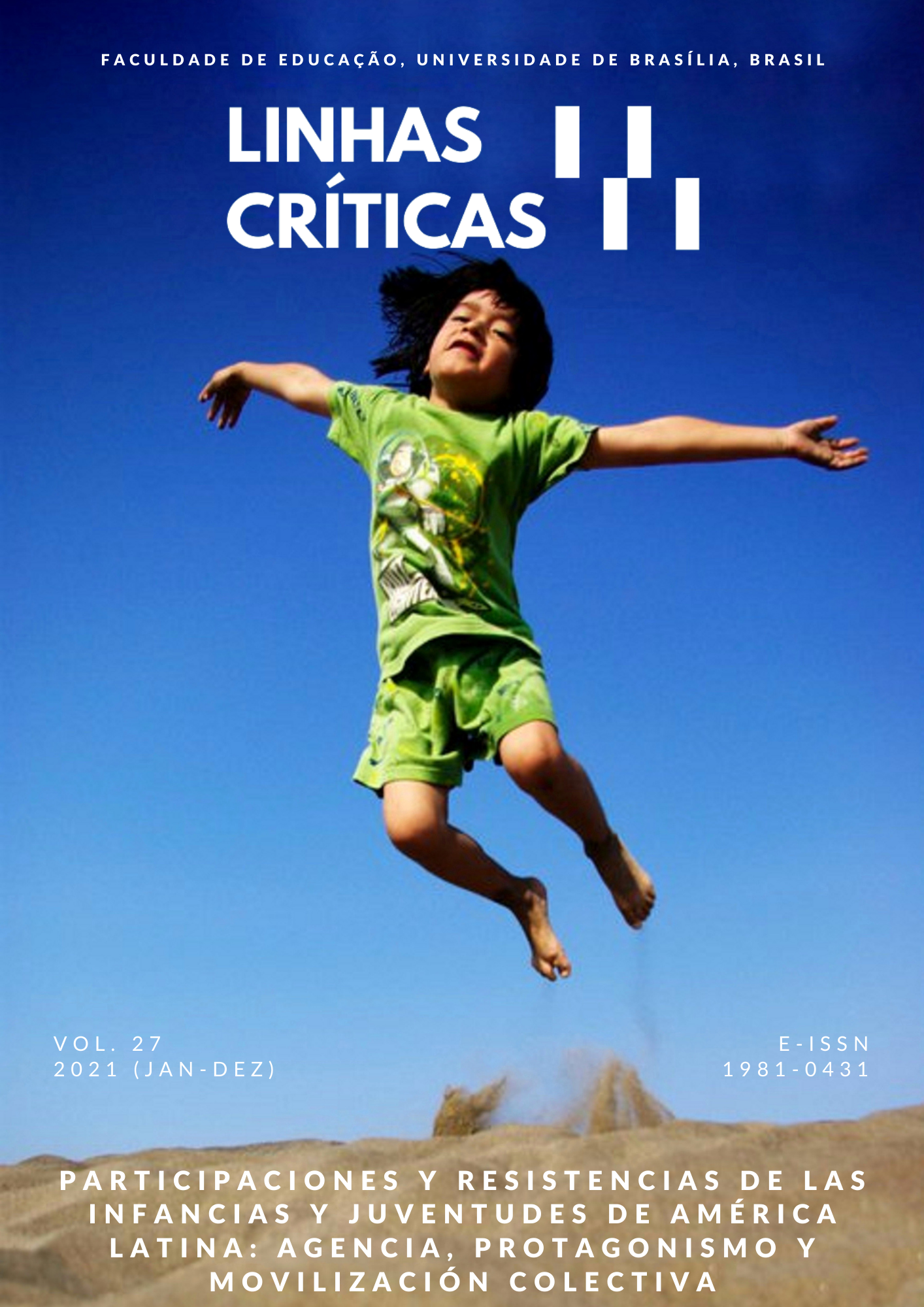Informal assessment and teacher expectations
understanding and relating concepts
DOI:
https://doi.org/10.26512/lc27202136736Keywords:
Informal assessment, Teaching expectations, ClassroomAbstract
Several studies analyze the relations in the classroom. Some of them use evaluation as a category of analysis, while others focus on teachers' expectations. In order to contribute to the debate, we present a bibliographical research which objective is to clarify the concepts of informal assessment and teacher expectation. It is understood that there are similarities between them, however, the approaches related to informal assessment broaden the reflections by contemplating the historical and social processes that reverberate on the teachers' conception. The thematic approach of teacher training courses is defended, considering the social and historical constructions, situated in a capitalist society.
Downloads
References
Bertagna, R. H. (2010). Avaliação e progressão continuada: o que a realidade desvela. Pro-Posições 21(3), 193-218. https://doi.org/10.1590/S0103-73072010000300012
Bourdieu, P., & Passeron, J. C. (1975). A Reprodução: Elementos para uma teoria do sistema de ensino (3ª Edição). Livraria Francisco Alves.
Bourdieu, P., & Saint-Martin, M. (2018). As categorias do juízo professoral. Em P. Bourdieu. Escritos da Educação (pp. 205-241). Vozes.
Freitas, L. C. (1995). Crítica da organização do trabalho pedagógico e da didática. Papirus.
Freitas, L. C. (2003). Ciclos, seriação e avaliação: confronto de lógicas. Moderna.
Freitas, L. C. (2010). Avaliação para além da “forma escola”. Educação: Teoria e Prática, 20(35), 89-99. https://www.periodicos.rc.biblioteca.unesp.br/index.php/educacao/article/view/4086
Freitas, L. C., Sordi, M. R. L., Malavasi, M. M. S., & Freitas, H. C. L. (2009). Avaliação Educacional: caminhando na contramão. Editora Vozes.
Gil, A. C. (2002). Como elaborar projetos de pesquisa (4ª edição). Editora Atlas.
Good, T. L. (1981). Teacher Expectations and Students Perceptions: a decade of research. Educational Leadership, 38(5), 415-422.
Good, T. L., & Brophy, J. E. (1970). Teacher’s Communication of Differential Expectations for Children’s Classroom Performance: some behavioral data. Journal of Educational Psychology, 61(5), 365-374. https://doi.org/10.1037/h0029908
Meissel, K., Meyer, F., Yao, E. S., & Rubie-Davies, C. M. (2017) Subjectivity of teacher judgments: Exploring student characteristics that influence teacher judgments of student ability. Teaching and teacher education, 65, 48-60. https://doi.org/10.1016/j.tate.2017.02.021
Oliveira, J. M., & Medeiros, C. C. C. (2018). Categorias do Juízo Professoral: entre interpretações, julgamentos e implicações. Estudos de Avaliação Educacional, 29(72), 710-737. https://doi.org/10.18222/eae.v29i72.4774
Perrenoud, P. (1986). Das diferenças culturais às desigualdades escolares: a avaliação e a norma num ensino diferenciado. Em L. Allal (et al.). Avaliação formativa num ensino diferenciado (pp. 133-155). Livraria Almeidina.
Pinto, A. L. G. (1994). A Avaliação da Aprendizagem: o formal e o informal. [Dissertação de mestrado, Universidade Estadual de Campinas]. Repositório Institucional da Unicamp. http://repositorio.unicamp.br/jspui/handle/REPOSIP/253855
Rist, R. (1970). Student Social Class and Teacher Expectations: The Self-Fulfilling Prophecy in Ghetto Education. Harvard Educational Review, 40(3), 411-451. https://doi.org/10.17763/haer.40.3.h0m026p670k618q3
Rosenthal, R., & Jacobson, L. (1981). Profecias auto-realizadoras na sala de aula: as expectativas não intencionais da capacidade intelectual dos alunos. Em M. H. S. Patto (Org.). Introdução à Psicologia Escolar (pp. 258-295). TA Queiroz.
Rubie-Davies, C. M., & Rosenthal, R. (2016). Intervening in teachers' expectations: A random effects meta-analytic approach to examining the effectiveness of an intervention. Learning and individual diferences, 50, 83-92. https://doi.org/10.1016/j.learninstruc.2021.101483
Timmermans, A. C., Rubie-Davies, C. M., & Rjosk, C. (2018). Pygmalion's 50th anniversary: the state of the art in teacher expectation research. Educational research and evaluation, 24(3-5), 91-98. https://doi.org/10.1080/13803611.2018.1548785
Timmermans, A. C., Rubie-Davies, C. M., & Wang, S. (2021). Adjusting expectations or maintaining first impressions? The stability of teachers’ expectations of students’ mathematics achievement. Learning and Instruction, 75. https://doi.org/10.1016/j.learninstruc.2021.101483
Villas Boas, B. M. F. (1995). Reflexões sobre a avaliação e a formação de profissionais da educação. Linhas Críticas, 1(1), 23-30. https://doi.org/10.26512/lc.v1i1.2598
Villas Boas, B. M. F. (2001). Avaliação formativa e formação de professores: ainda um desafio. Linhas Críticas, 12(22). https://doi.org/10.26512/lc.v12i22.3283
Villas Boas, B. M. F. (2011). Compreendendo a avaliação formativa. Em B. M. F. Villas Boas (Org.). Avaliação formativa: práticas inovadoras (pp. 13-42). Papirus.
Villas Boas, B. M. F., & Soares, S. L. (2016). O lugar da avaliação nos espaços de formação de professores. Cadernos Cedes, 36(99), 239-254. https://doi.org/10.1590/CC0101-32622016160250
Published
How to Cite
Issue
Section
License
Copyright (c) 2021 Camila Maria dos Santos, Luana Ferrarotto

This work is licensed under a Creative Commons Attribution 4.0 International License.
Authors who publish in this journal agree to the following terms:
-Authors maintains the copyright and grants the journal the right of first publication, the work being simultaneously licensed under the Creative Commons Attribution License which allows the sharing of the work with recognition of the authorship of the work and initial publication in this journal.
- Authors are authorized to enter into additional contracts separately, for non-exclusive distribution of the version of the work published in this journal (eg publish in institutional repository or as a book chapter), with acknowledgment of authorship and initial publication in this journal.
-Authorers are allowed and encouraged to publish and distribute their work online (eg in institutional repositories or on their personal page) at any point before or during the editorial process, as this can generate productive changes as well as increase the impact and the citation of published work (See The Effect of Free Access).



